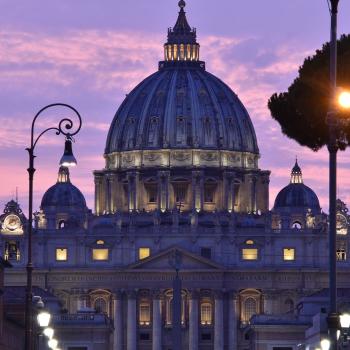Editors' Note: This article is part of the Patheos Public Square on Sacrifice: Religions and the Role of the Scapegoat. Read other perspectives here.
When was the last time you sacrificed something for your faith or for some other deeply held belief? In answering that question, do you struggle to find an instance in which your actions met or surpassed the lofty examples of sacrifice we tend to find in our holy texts or in the examples of historical figures who are held up as exemplars of sacrifice? If you are religious, do your thoughts almost immediately center on the struggles of prophets and their followers? If so, then the story of Ibrahim (Abraham) is for you, but perhaps not for the reason you think.
Muslims, Christians, and Jews all count Ibrahim as a common ancestor in monotheistic belief. It is from him that we directly trace the branches of monotheistic faith that are most prevalent in the world today, and all three religions praise him for his willingness to sacrifice his firstborn son for the sake of Allah. But do you really know Ibrahim?
Aside from the prophet Mohammed, Ibrahim is maybe my favorite Quranic prophet. I say that because I can relate to him. That may sound strange coming from a Muslim who has, at his disposal, detailed chronicles of the most minute and human activities of Mohammed's life. Indeed, I go about my day attempting to follow the character and confirmed practices of Mohammed, but Ibrahim is simply someone with whom I can relate in terms of my own personal journey.
According to the Quran and Hadith literature, Ibrahim lived a rather solitary life. Aside from his wives, Sarah and Hajar (Hagar), he didn't have friends or a community in which he was active or to whom he ministered. He was more of an itinerant preacher, and he quite literally trekked from modern-day Iraq to Syria, onward to Turkey, down into Palestine, over to Egypt, and eventually to Mecca in the Arabian peninsula. During those travels and through the travails he faced, Allah was his only non-familial companion and was his one true source of strength and support. It is for this reason that he is given the honorific title of Khalilullah, or the friend of Allah.
The regions through which he traveled were about as inhospitable then as they are today. Some years ago, working as a journalist, I traveled to Iraq with a U.N.-sanctioned aid agency, and I can confirm that the heat and the landscape make for hard living and even harder traveling. We even visited what we were told were the ruins of Ur, where Ibrahim is said to have been born and from which he began his journey. Standing there in Ur, it struck me that Ibrahim's sacrifice was so much more than conventionally understood.
In our houses of worship, we talk of the enormity of being asked to kill one's very own son, a command that Allah gave Ibrahim after he had already instructed him to leave that very same son and his mother alone in the barren wasteland of pre-settled Mecca, with no provisions and nothing more than a promise from Allah.
In annual sermons about Ibrahim, which generally coincide with the Hajj pilgrimage — a ritual begun by Ibrahim — one's attention is generally drawn to the grand gestures that Ibrahim made in service to his lord. The focus is on Ibrahim's lack of hesitation, complete submission, and ultimate willingness to trust that Allah's decree was best. It is often an emotional telling of those events, and the implied question to the listener is: Given what Ibrahim was willing to sacrifice, what are you willing to sacrifice for Allah? I used to walk away from such sermons with the belief that I too must make a grand gesture of sacrifice, something well beyond my current attempt at proving my faith.
Having myself traveled to a number of the places that Ibrahim visited, and having made the Hajj pilgrimage multiple times, it strikes me that focusing on the grand gestures of sacrifice can leave one overwhelmed and impotent in the face of the many minor trials and tribulations we face in life. Though there are people in the world who are asked to make gut-wrenching life or death sacrifices (think of the Syrians forced to leave a child to drown in the Mediterranean in order to save another child), most of us will never face such trials. Instead, we face what Ibrahim faced throughout the majority of his life: the day-to-day grind, the plodding along from one mundane life event to the next.
We can all relate to this. We wake up, drag ourselves to jobs and activities that are less than thrilling, gobble down a hurried bite to eat when we have time, fight through traffic, wrangle children, sit exhausted on a sofa at the end of the day, and struggle to get a good night's sleep as a thousand worries and thoughts race through our minds. It is in these moments that the life of Ibrahim becomes most relevant and that the truest meaning of sacrifice is revealed to us.




